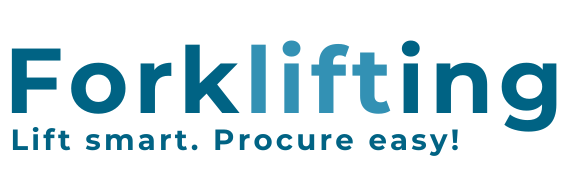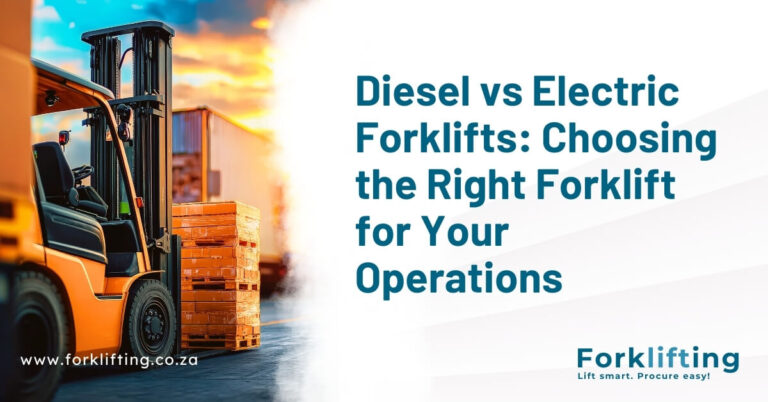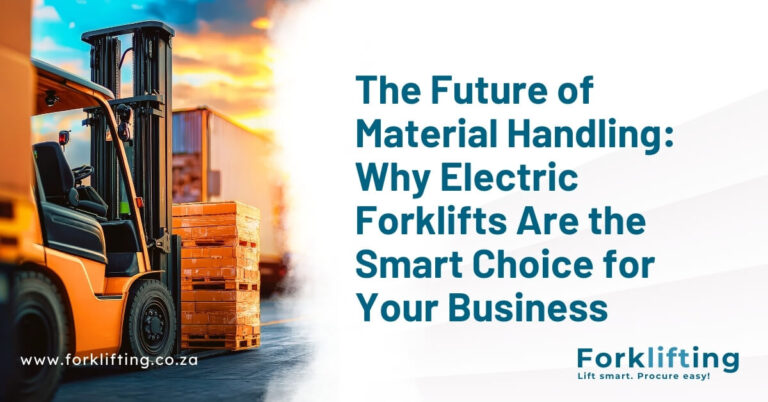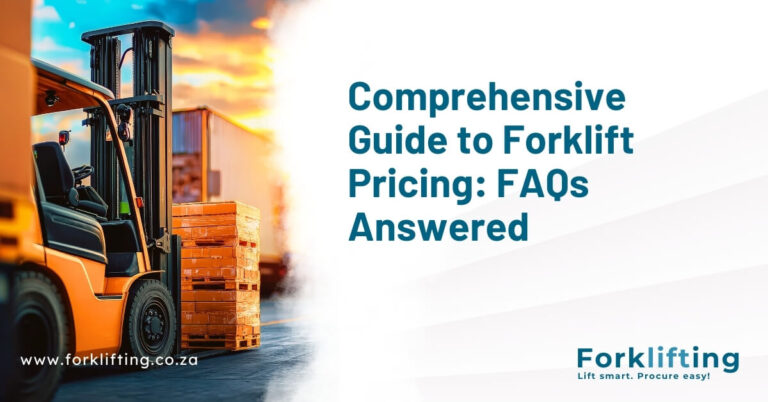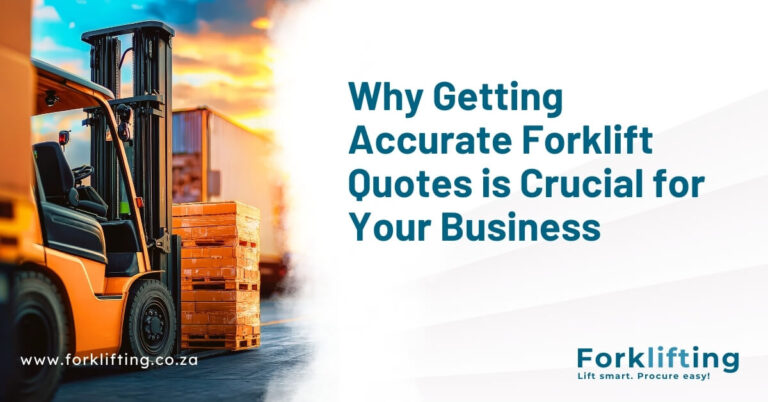If you’re a procurement officer, operations manager, or business owner, you understand the importance of making smart purchasing decisions. When it comes to buying a used forklift, the stakes are high. A poor choice can lead to unexpected repair costs, safety hazards, and inefficiencies in your operations. However, a well-researched purchase can save you thousands of rands while still providing the reliability and performance you need.
In this guide, we’ll walk you through how to evaluate used forklifts, where to get the best forklift quotes, and key factors to consider before making a purchase.

1. Why Consider Buying a Used Forklift?
Purchasing a used forklift can be a cost-effective solution for businesses looking to expand their fleet without breaking the bank. Here’s why buying second-hand forklifts might be the right move for you:
- Cost Savings – Used forklifts are significantly cheaper than new models, often costing 30-50% less.
- Immediate Availability – No waiting for manufacturer lead times; most used forklifts are available for immediate purchase.
- Proven Performance – If well-maintained, a used forklift can deliver years of reliable service.
- Variety of Options – The second-hand forklift market offers a broad range of brands, models, and specifications, giving buyers flexibility.

2. How to Know If You’re Getting a Good Deal on a Used Forklift
To ensure you’re making a wise investment, consider these factors when reviewing forklift quotes:
A. Check the Forklift’s Hours and Age
Just like a car’s mileage, the operating hours of a forklift determine its wear and tear. A forklift with less than 10,000 hours is generally considered to be in good condition.
- Low hours (under 5,000): Excellent condition, minimal repairs needed.
- Medium hours (5,000 – 10,000): Moderate use, may need minor repairs.
- High hours (10,000+): Higher risk of maintenance issues, but could still be valuable if well-maintained.
B. Inspect for Visible Wear and Tear
Check for cracks, leaks, and rust, especially in the mast, forks, and tires. A thorough mechanical inspection should cover:
- Mast && Hydraulic system – Are there any leaks? Does the mast move smoothly?
- Battery and charger (for electric forklifts) – A new battery costs thousands, so check how much life is left.
- Engine performance (for diesel or LPG models)
- Tires – Are they worn out? Solid tires should have at least 1-inch thread depth left.
- Brakes – Test stopping power. A soft pedal is a red flag.
- Forks – Are there any bends or cracks?
Related: Diesel vs Electric Forklifts: Choosing the Right Forklift for Your Operations
C. Verify Maintenance History
Ask for service records to ensure the forklift has been regularly maintained. A forklift with consistent servicing is more reliable than one with a patchy history. A well-maintained forklift = fewer breakdowns. Look for regular servicing (oil changes, battery replacements, tire changes, etc). Avoid forklifts with gaps in service history.
D. Test Drive It
It is essential to test drive a used forklift before you buy it. During a test drive – drive it forward and in reverse and listen for any strange and unusual noises. Lift and lower a load to check if it vibrates or struggles to lift; check turning the forklift to confirm if the steering is smooth.
E. Compare Market Prices
Do your online research to check for prices of similiar models to make sure you’re not overpaying. Factor in any repair costs if needed.
F. Consider the Dealer’s Reputation
Purchasing from a reputable forklift supplier or dealer reduces the risk of buying a headache. Look for reviews and ratings from other customers to gauge trustworthiness. Reputable dealers may offer a warranty on their pre-owned forklifts.
G. Red Flags to Watch Out For
If you’re considering buying a used forklift some red flags to look out for include a freshly painted forklift – perhaps some damage is being hidden. Cheap Prices that are too good to be true – often mean major issues. An unclear service history may indicate that the used forklift has not been well maintained and if you spot any visible leaks – this could only mean trouble is not far down the road

3. Key Features to Look for When Buying a Used Forklift
Not all forklifts are the same, and selecting the right one depends on your specific needs. Here’s what to consider:
A. Load Capacity
Determine the maximum weight you need to lift. Forklifts typically range from 1,500kg to over 16,000kg in lifting capacity.
B. Lift Height
Assess your warehouse or storage facility’s height requirements. Standard forklifts can lift from 2.5m to over 6m.
C. Fuel Type
- Electric Forklifts – Ideal for indoor use, environmentally friendly, lower operational costs.
- Diesel Forklifts – Best for outdoor, heavy-duty applications.
- LPG Forklifts – Versatile, suitable for both indoor and outdoor use.
Related: Diesel vs Electric Forklifts: Choosing the Right Forklift for Your Operations

4. Where to Find the Best Used Forklifts for Sale
If you’re searching for used forklifts for sale, here are the best places to look:
- Online Marketplaces – Platforms like Forklifting.co.za offer you access to reliable forklift suppliers. Request forklift quotes for used forklift sales. Other online marketplaces such as Autotrader provide a range of listings from various sellers – be sure to evaluate the seller.
- Authorized Dealers – Buying from a certified dealer ensures quality and often comes with warranties.
- Auctions – You can find forklifts at great prices, but be cautious and inspect them thoroughly before bidding.
- Business Liquidations – When companies close or upgrade their fleet, you can find well-maintained forklifts at discounted prices.

5. The Role of Forklift Quotes in Getting the Best Deal
Comparing forklift quotes helps you get the best price and terms. When requesting quotes, ensure they include:
- Total price (including VAT and additional fees)
- Warranty details
- Delivery and service options
- Breakdown of included features (battery, tires, attachments, etc.)
Pro Tip: Get at least three different forklift quotes before making a decision.
Related: Get Free Forklift Quotes Today

6. Final Checklist Before You Buy
Before committing to a purchase, use this final checklist:
✔️ Have you checked the forklift’s operating hours?
✔️ Have you reviewed its service history?
✔️ Have you inspected it for wear and tear?
✔️ Have you compared at least three forklift quotes?
✔️ Have you verified the dealer’s reputation?
If you’ve answered yes to all the above, you’re ready to make a smart investment in a used forklift!

Boost Your Buying Confidence with Forklifting.co.za
At Forklifting.co.za, we make finding the best used forklifts simple and stress-free. Whether you’re looking for forklift quotes, used forklifts for sale, or expert guidance on buying, we’ve got you covered.
By following these steps, you can confidently invest in a forklift that meets your business needs while saving money and avoiding costly mistakes.
Got questions? Contact us for expert advice!
